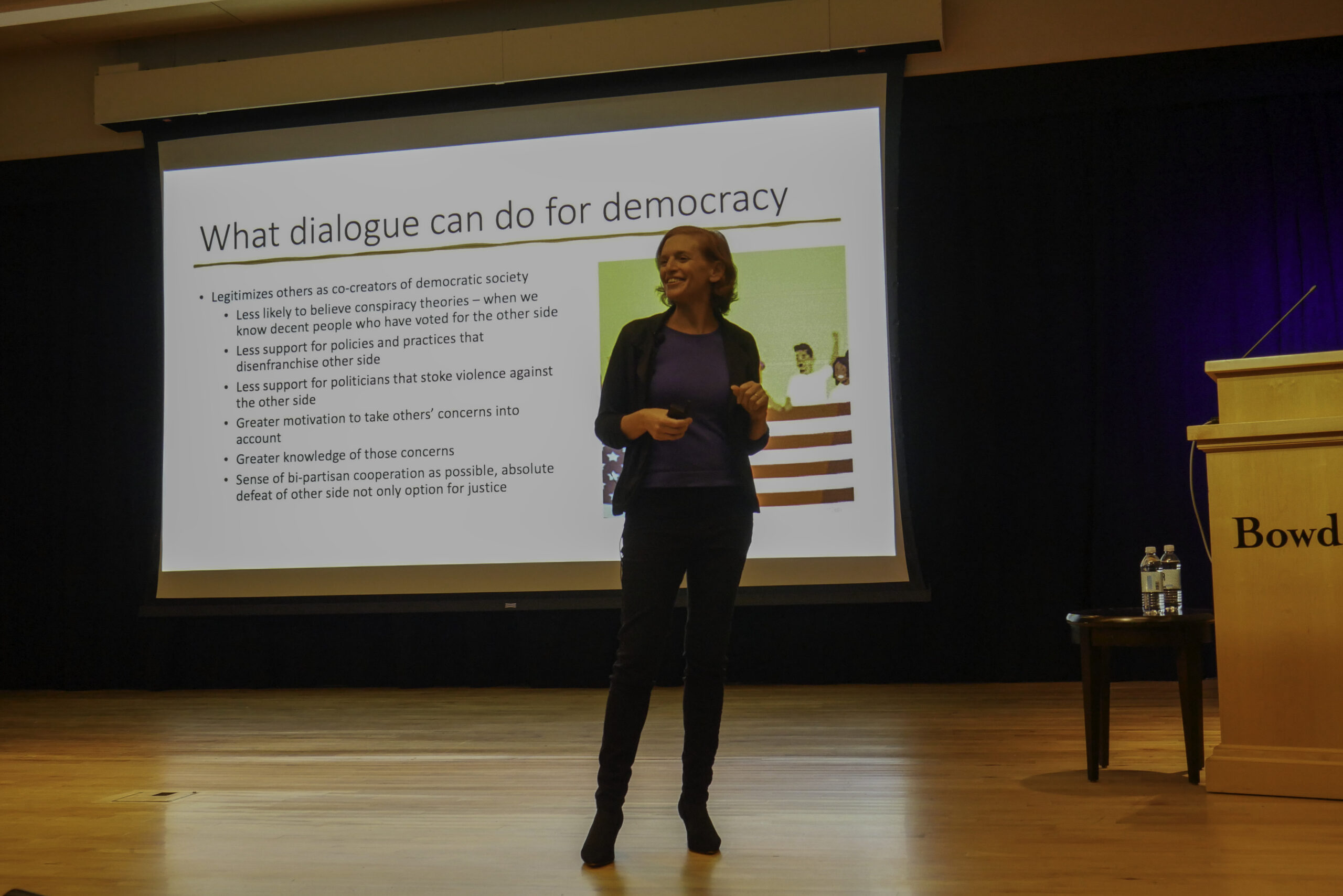Rachel Wahl talks about productive political discourse on college campuses
October 18, 2024
 Abigail Hebert
Abigail HebertOn Wednesday afternoon, students, faculty and community members gathered in Kresge Auditorium to hear Rachel Wahl, associate professor at the University of Virginia’s School of Education and Human Development, give a talk on political dialogue and its benefits.
The talk, “Keeping Our Enemies Closer: Political Dialogue on College Campuses,” was the third lecture in a series this fall hosted by the Office of Inclusion and Diversity. The series aims to bring scholars from across the country to make sense of the current state of politics before the upcoming presidential election. Two more lectures will take place in the coming weeks.
Wahl began the talk by highlighting her past research on public forums between law enforcement and communities. Since 2017, Wahl has focused her research on efforts to bring together college students on opposite sides of the political spectrum.
In the past few years, Wahl noted, the state of civil political dialogue in the United States has been contentious.
“Americans have become divided, not only on substantive issues like abortion or economic welfare policies, but also on whether and how they should talk to people they disagree with,” Wahl said. “We’re divided over the very nature of how we should handle the fact that we’re divided.”
Wahl then discussed the research she conducted over two years on college campuses throughout the eastern United States, where she observed deliberative dialogues between students of opposing political views. She reached out to participating students three years after initially interviewing them to observe if political discussions on campus altered their viewpoints. But the results were not what she expected.
“They don’t shift in their political views, but they do shift very often and very dramatically in how they feel about the students on the opposing side,” Wahl said.
Wahl noted three different kinds of change she observed. The first was personalization, a process in which students recognized the humanity of those they disagreed with. This was followed by recognizing the ethical motivations and good intentions of their opponents. Finally, students acknowledged the soundness of some of their opponents’ ideas.
Wahl emphasized the importance of recognizing the ideological disagreements at stake, saying that the typical rush to find common ground between opposing sides can be harmful.
“Then people leave thinking, ‘Okay, then why are they voting for a different candidate then me … why are they making such a terrible mistake?’” Wahl said. “When students were able to drill down [why they disagree],… they were most likely to see the other person as decent and sound, even as they were then going to vote for different people.”
However, she noted, dialogue isn’t always the solution, citing examples from her research where students were made uncomfortable by discussions of active proposals or laws that affected them.
“I think we need to recognize … that dialogue is not dispensable, but it is also not perfect,” Wahl said. “It becomes hard to see that something like civil discourse … can be necessary and also be experienced as harmful.”
Despite this, she believes dialogue is an important way to promote introspection and ideological development.
“When I followed up with students years later, the deepest shifts [in ideology] were often in response to conversations in which people felt like they were being spoken to not as a means to an end, but as an end in themselves,” Wahl said. “They felt like someone wasn’t just trying to argue them out of their position, but really cared about what they thought.”
Another benefit of civil political dialogue, according to Wahl, is that it legitimizes others as co-creators of democratic society—making people see their opponents as not villains, but as fellow citizens with their own well-founded opinions. She identified several possible political benefits from this shift.
“I think it makes us less likely to try to disenfranchise the people we disagree with and more likely to include them … and less likely to support candidates that incite violence against the other side,” Wahl said. “Bipartisan cooperation could be possible once we see that the people we disagree with are not always stupid, crazy and bad.”
Zach Green ’28 attended the talk because of his interest in education. He said his main takeaway was to always ask questions.
“Even when there’s not a space for being curious, always be curious,” Green said.
Green emphasized the value of political dialogue with people you disagree with, saying that even in just a few months at Bowdoin, his idea of the College as a purely liberal place has been changed.
“I’ve already talked to a bunch of conservative people who I never would have expected [to meet],” Green said. “Those have been some of my best conversations.”

Comments
Before submitting a comment, please review our comment policy. Some key points from the policy: